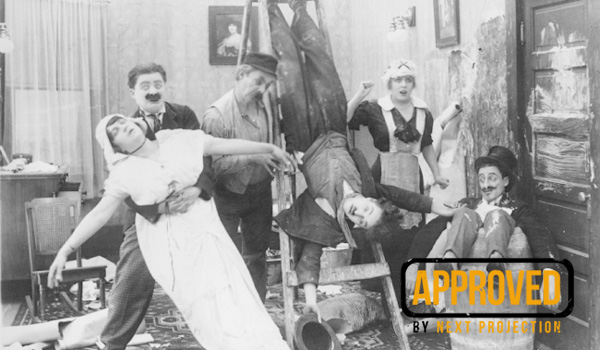Subversive Saturday: Work (1915)
Cast: Charles Chaplin, Charles Inslee
Director: Charles Chaplin
Country: USA
Genre: Short , Comedy
Watch it: Here
The following review is a continuation of Matthew Blevins’ Subversive Saturdays series.
For this week’s Subversive Saturday entry, we take a look at Chaplin’s Essanay era film Work. This is an early film in Chaplin’s oeuvre and the parameters of his iconic tramp character had not yet been solidified. He has moments where he possesses the terse indignation of Buster Keaton, but the heart of the tramp that we know and love shines through at all times. Chaplin aligns himself with the working class and identifies the problems of the upper class as being petty and detached from the realities of the world.
Chaplin is used in any number of undignified tasks that offer both hilarity and a strong indictment of the conditions of the time. He is forced to pull a cart up a hill, because clearly manual labor was more available than horses and motorcars in Chaplin’s version of reality. With a simple tilting of the camera, he creates a wonderfully tense angular composition that makes his task seem both impossible and incredibly dehumanizing. In this simple effect he shows an alliance with the working class and as he inevitably rolls backwards down the hill he nearly misses an indifferent parade of streetcars. The gag is beautiful in its simplicity but illustrates both his subversive wit and his willingness to risk personal harm for his craft. There is no sleight of hand in his practical effects, and the inherent danger of the sequence still packs a visceral punch after nearly a century.
With a simple tilting of the camera, he creates a wonderfully tense angular composition that makes his task seem both impossible and incredibly dehumanizing.
 Meanwhile in upper class homes, men are demanding a hot breakfast and are afforded the luxury of missing work out of a stubborn sense of entitlement. Domestic duties offer resistance at every turn as a stubborn stove refuses to light in an anthropomorphic revolt against its foppish captors. When Chaplin and his foreman arrive to carry out their work of wallpapering the house they are forced to suffer the nagging demands of the bourgeoisie housewife. She demeans their character by quickly stashing away her silver in a safe, setting up Chaplin for one of the funniest gags in the film as he mimics her accusatory actions by stashing away the contents of his pockets. He may be at the bottom rung even among the working class, but with this simple gesture he proclaims his dignity while getting a laugh at the expense of her preemptive accusations. Chaplin shows ineptitude with every task he performs, but he retains a sense of dignity and always gets the better of his “superiors” of social standing.
Meanwhile in upper class homes, men are demanding a hot breakfast and are afforded the luxury of missing work out of a stubborn sense of entitlement. Domestic duties offer resistance at every turn as a stubborn stove refuses to light in an anthropomorphic revolt against its foppish captors. When Chaplin and his foreman arrive to carry out their work of wallpapering the house they are forced to suffer the nagging demands of the bourgeoisie housewife. She demeans their character by quickly stashing away her silver in a safe, setting up Chaplin for one of the funniest gags in the film as he mimics her accusatory actions by stashing away the contents of his pockets. He may be at the bottom rung even among the working class, but with this simple gesture he proclaims his dignity while getting a laugh at the expense of her preemptive accusations. Chaplin shows ineptitude with every task he performs, but he retains a sense of dignity and always gets the better of his “superiors” of social standing.
He may be at the bottom rung even among the working class, but with this simple gesture he proclaims his dignity while getting a laugh at the expense of her preemptive accusations.
 Each gag acts in service of Chaplin’s social commentary and not a single scene is wasted as the film builds to its chaotic finale. With the arrival of the housewife’s secret lover, the film builds to a frenetic crescendo and no one remains unscathed in the maelstrom of wallpaper glue and gunpowder. The stove carries out its final act of explosive defiance, and all have been equalized in the resulting rubble. Work is a deceptively simple short film, but Chaplin’s unique ability to combine impassioned commentary on social conditions with his brilliant physical comedy make this an essential film in the subversive canon that is still every bit as powerful as it was nearly one hundred years ago.
Each gag acts in service of Chaplin’s social commentary and not a single scene is wasted as the film builds to its chaotic finale. With the arrival of the housewife’s secret lover, the film builds to a frenetic crescendo and no one remains unscathed in the maelstrom of wallpaper glue and gunpowder. The stove carries out its final act of explosive defiance, and all have been equalized in the resulting rubble. Work is a deceptively simple short film, but Chaplin’s unique ability to combine impassioned commentary on social conditions with his brilliant physical comedy make this an essential film in the subversive canon that is still every bit as powerful as it was nearly one hundred years ago.















 Review: The Samaritan (2012)
Review: The Samaritan (2012) DVD Review: We Were Here (2011)
DVD Review: We Were Here (2011) Review: Blood of My Blood (2011)
Review: Blood of My Blood (2011) Review: Damsels in Distress (2011)
Review: Damsels in Distress (2011) DVD Review: My Perestroika (2010)
DVD Review: My Perestroika (2010)

